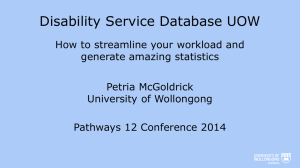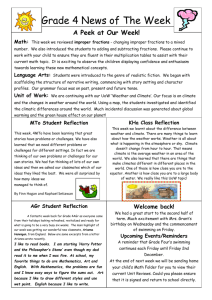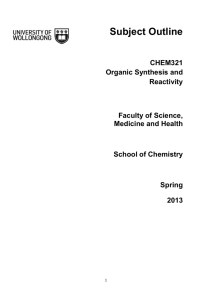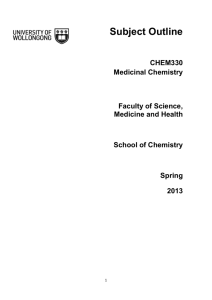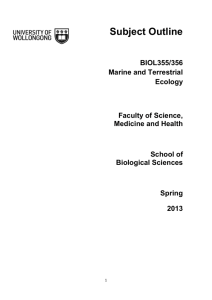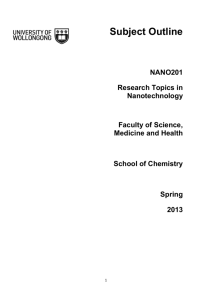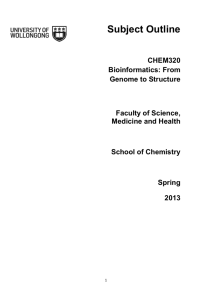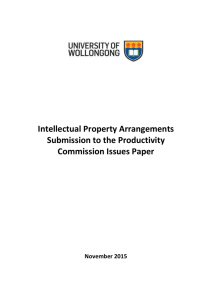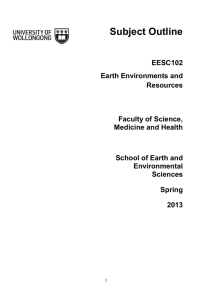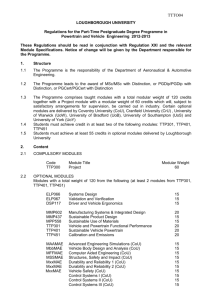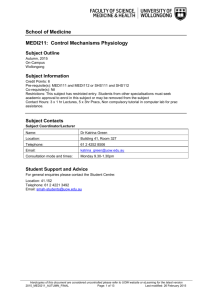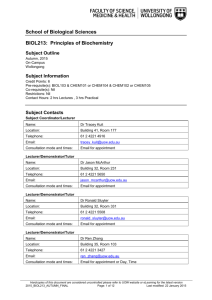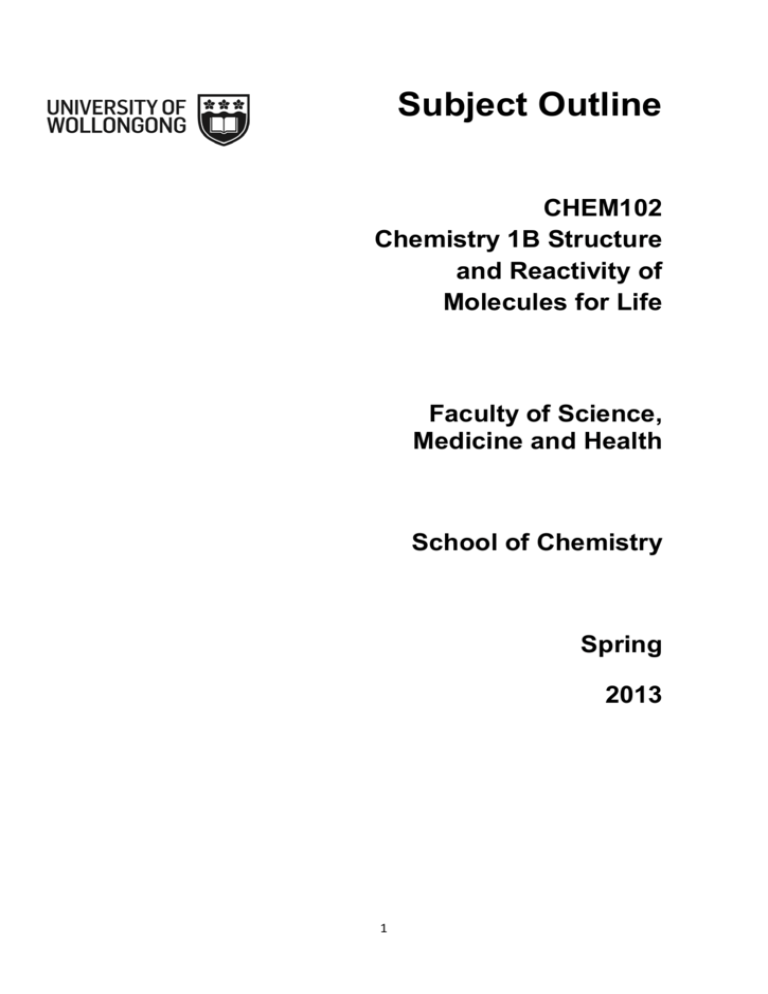
Subject Outline
CHEM102
Chemistry 1B Structure
and Reactivity of
Molecules for Life
Faculty of Science,
Medicine and Health
School of Chemistry
Spring
2013
1
Subject Outline
Subject code:
CHEM102
Subject name:
Chemistry 1B Structure and Reactivity of Molecules for Life
Credit points:
6
Pre/co-requisites:
None
Mode of delivery:
On Campus
Delivery location:
Wollongong
Version history
1st edition
Glennys O’Brien, Faculty of Science , UOW
© University of Wollongong 2013. All rights reserved.
2013
Copyright and Disclaimer
No part of this work may be reproduced without the prior written consent of the University of Wollongong. All requests and
enquiries should be directed to the Vice-Principal (Administration), University of Wollongong, Northfields Avenue, Wollongong
NSW 2522 Australia. Within Australia telephone (02) 4221 3920; international +61 2 4221 3920.
http://www.uow.edu.au/about/disclaimer/index.html
The University of Wollongong attempts to ensure that the information contained here is correct at the time of production,
however, sections may be amended without notice by the University in response to changing circumstances or for any other
reason.
2
Contacts
Subject Co-ordinator
Name:
Dr Glennys O'Brien
Faculty of Science, Medicine and Health
Location
41.152
Telephone
Email
61 2 4221 3492
smah_student_enquiries@uow.edu.au
Consultation mode and times:
_________________________________________________________________________
Email
Consultation
times
M 11.30, Tu
2.30, W 1.30, Th
1.30
Lecturers/Tutors
Office
Phone
Dr Glennys O'Brien
18.112
42213072 gobrien@uow.edu.au
Dr Simon Bedford
18.G20 42213294 sbedford@uow.edu.au
By appointment
Assoc Prof Stephen Wilson
18.102
4221 3505 chemistry@uow.edu.au
(Head of School,
for
appointment
see admin staff
rm 18.102)
Dr Berwyck Poad
18.120
42213281 bpoad@uow.edu.au
by appointment
Assoc Prof Stephen Ralph
18.226
42214286 sralph@uow.edu.au
TBA
Dr Chris Hyland
18.126
4221 4953 chris_hyland@uow.edu.au
by appointment
Prof Stephen Pyne
18.121
42213511 spyne@uow.edu.au
by appointment
Mrs Rosemary Ward
18.112
42213072 rosward@uow.edu.au
TBA
Dr Danielle Skropeta
18.127
42214360 skropeta@uow.edu.au
TBA
Dr Michael Kelso
18.115
42215085 mkelso@uow.edu.au
TBA
Dr Garry Mockler
18.218
4221 3514 garry_mockler@uow.edu.au
by appointment
3
Subject Information
Outline
Chemical Equilibrium, Acid Base, electrochemical. Organic chemistry: nomenclature,
functional groups, isomerism, hydrocarbons, alkenes/alkynes and electrophilic addition,
aromatic compounds and electrophilic substitution, functional groups chemistry and
nucleophilic substitution/elimination, synthetic and natural polymers.
For the detailed subject content outline, see Subject Content, p 7 Subject Handbook – Lab
Manual. This content listing is also available in Moodle.
Learning Outcomes
Through successful completion of this subject students will be able to:
On successful completion of this subject, students should be: 1) familiar with basic chemical
concepts in the area of Physical and Organic Chemistry; 2) able to interpret written
instructions and perform basic chemical experiments safely and effectively, including organic
syntheses; 3) able to record experimental results and interpret and communicate
conclusions based on observations; and 4) able to employ basic mathematics to solve
quantitative chemical problems.
Faculty Graduate Qualities
Valuable qualities gained by UOW graduates are essential for gaining employment and
making an important contribution to society and their chosen field – further information is
available at http://www.uow.edu.au/about/teaching/qualities/
Engagement in this subject will contribute to each student’s development of the following
UOW Graduate Qualities:
Informed
• Comprehensive knowledge of an area of Science and well-developed skills in using
relevant technologies
• Awareness of the international context in which advances in Science are made and
applied
Independent learners
• Critical thinking skills
• Scientific approach to the acquisition, analysis, and interpretation of data
Independence in seeking to extend knowledge through ongoing research, enquiry and
reflection
• Problem solvers
• Application of creative, logical and critical thinking to scientific problems
Effective communicators
• Well-developed written, oral & aural communication
• Effective collaboration and teamwork across a range of settings and cultures
Responsible
4
•
•
Ethical decision making
Respect for diverse opinions, professions, and cultures
Lecture/Tutorial/Laboratory Times
Refer to http://www.uow.edu.au/student/timetables/index.html for an up-to-date timetable.
Lectures: Monday 12.30-2.30pm, Tuesday 12.30-1.30pm. 40.153.
Workshops (Tutorials): (one hr) Choose a workshop that fits your timetable.
Wed 8.30 am
67.101
4.30 pm
19.G026
4.30 pm
24.102
Thu
9.30 am
10.30 am
4.30 pm
4.30 pm
3.121
24.102
19-G026
24.102
Fri
9.30 am
2.30 pm
19.G026
24.104
Laboratories: Weekly 3 hour laboratory with pre-laboratory requirement accessed through
eLearning, Lab 1, prelab in Manual. Attend labs from week 1 to week 12. All labs take place
in the first year laboratory Rm 41.340. Practical Times: Wednesday 9.30 – 12.30, 13.30 –
16.30, 17.30 – 21.30, Thursday 9.30 – 12.30, 13.30 – 16.30, 17.30 – 21.30, Friday 9.30 –
12.30, 13.30 – 16.30.
Enrol for lab classes via SOLS: http://www.uow.edu.au/student/ or, if closed, email Roger
Kanitz 18.G02; e-mail: rkanitz@uow.edu.au.
Study Time
Students should note that UOW policy equates 1 credit point with 2 hours of study per week
that includes lectures and tutorials. For example, in a 6 credit point subject, a total of 12
hours of study per week is expected.
Prescribed Reading
Brown T.L., et al “Chemistry The Central Science: A Broad Perspective” 2010. Pearson.
Karty J., The Nuts and Bolts of Organic Chemistry.
5
Recommended Readings
The recommended readings are not intended as an exhaustive list and students should use
the Library catalogue and databases to locate additional resources.
Materials
1.
The Subject Handbook (Lab Manual) containing details of the subject, laboratory
instructions, templates for data collection and submission of lab reports and pre-labs as
required. Preworkshop study materials, Part A, are also in the manual. The manual is
available for purchase from the Unishop. A copy of the handbook is available as pdf in
Moodle. The pre-lab computer based exercises are accessed via Moodle.
2.
Safety glasses, lab coats and closed footwear are mandatory in the laboratory. Lab
coats and safety glasses may be purchased from the Unishop or any suitable supplier.
e-Learning: Moodle
This subject has materials and activities available via Moodle. To access Moodle you must
have a UOW user account name and password, and be enrolled in the subject. eLearning is
accessed via SOLS (student online services). Log on to SOLS and then click on the
eLearning link in the menu column.
For information regarding the eLearning spaces please use the following links:
Moodle - http://uowblogs.com/moodlelab/files/2013/05/Moodle_StudentGuide-1petpo7.pdf
PASS
PASS (Peer Assisted Study Sessions) is an academic mentoring program where
experienced senior students are available to help you with CHEM102. In a one hour PASS
session each week you can learn strategies and consolidate concepts that will save you
many hours struggling at home on your own. You will also get a chance to learn more deeply
in this subject, which will form the foundation for many of your later-year subjects. For more
information about PASS visit the website: http://www.uow.edu.au/student/services/pass
Lecture Schedule or Topic List
See eLearning: Moodle
6
Assessment
Minimum attendance requirements
All laboratory classes are compulsory and attendance is recorded for all of weeks 1-12,
except week 8. Attendance means, in the case of a practical class, that you complete the
experimental, lab write up, report submission and leave your lab space appropriately tidy.
Entry to the lab for a practical class is conditional on completion of the associated Prelab in
eLearning for every practical class. Penalties will apply for non-completion of Prelabs, these
will be either mark deduction or no entry to the lab.
In order to pass CHEM101, a maximum of 2 (two) absence from practicals is allowed on
account of illness or other misadventure, compassionate reason. Note that ALL labs are
ASSESSED. Marks (0 if absent) are included in your lab/workshop mark whether you were
present or not, UNLESS an academic consideration is granted. If you are absent submit a
request for Academic Consideration to the University Administration via SOLS on or no later
than three working days after the day of that scheduled class, with a medical certificate or
other explanatory letter for medical or compassionate grounds submitted to Student Central
as hard copy by mail or in person, on the same day or the next working day. See the
academic consideration policy for the details,
http://www.uow.edu.au/about/policy/UOW058721.html#P240_19680.
Repeating students may apply to the Coordinator for laboratory exemption if the previous
mean practical / workshop combined marks ≥ 17/25. Exemption is not automatic.
Minimum performance requirements
Students need to complete each component at the level specified.
Component
Final Examination (1)
50% of final mark
Minimum Standard
40% of the exam
ie. 20 marks of the 50
marks in final total mark
Must attend 9 of 11,
average > 10/20
Laboratory Practical
Reports (11)
20% of final mark
Students who do not meet the minimum performance requirements as set out in the Subject
Outline may be given a Fail grade or TF (Technical Fail) grade on their Academic Transcript.
See the General Course Rules at
http://www.uow.edu.au/handbook/generalcourserules/index.html
7
Summary of Assessment
Task
Title
Weighting
Due Date
Laboratory reports (11)
See each lab
20%
End of each lab
class
Moodle online assignments (5)
Assignment 1-5
15%
Friday 10 pm of
weeks 4, 6, 9, 11,
13.
Mid term test
Mid term test
10%
Week 8
Workshop Part A weekly online
participation (12), need minimum
of 10 of 12 completed, need 1 of
2 questions correct.
Workshop Part A
5%
Weekly, week 2week 13
Final Examination
Final Examination
50%
Exam time
Performance grades
HD
D
C
P
PS
F
TF
High Distinction
Distinction
Credit
Pass
Pass Supplementary
Fail (unsatisfactory completion)
Technical Fail
85–100%
75–84%
65–74%
50–64%
50%
0–49%
No mark recorded
Scaling
Marks awarded for any assessment task (including examinations) may be subject to scaling
at the end of the session by the Unit Assessment Committee and/or the Faculty Assessment
Committee (FAC). Marks will only be scaled to ensure fairness/parity of marking across
groups of students. Scaling will not affect any individual student’s rank order within their
cohort. For more information refer to Assessment Guidelines – Scaling
http://www.uow.edu.au/about/policy/UOW058609.html
8
Submission and Return of Assessment Items
Component
Laboratory
Practical Reports
(11)
Prelabs
Preworkshop
(Part A)
online
assignments (5)
Mid-term test (1)
Submission and Return of
assessments
Templated practical report (template
given in subject handbook) submitted
at the end of that practical.
Returned marked at the next
practical.
work in subject handbook and online
submission
Part A activities in subject Handbook
with support and embedded
questions online.
Submission and immediate automatic
marking on line within Moodle.
Results immediately available,
marked submission immediately
available to be viewed.
Submission at test, return via Lab or
Workshop classes.
Submission Date
submission:
end of that Lab class.
Online, due by 10pm evening
before your lab class.
Online, due week of
workshop.
5 assignments
all assignments close at 10
pm on due date
Assignment 1 Fri week 4
Assignment 2 Fri week 6
Assignment 3 Fri week 9
Assignment 4 Fri week 11
Assignment 5 Fri week 13
Week 8, notification to come.
Students are advised to keep an electronic or hard copy of all submitted assessment tasks
except in circumstances where this is not possible e.g. where the task is submitted at the
end of activity in which it was completed.
Late Submission
All assessment tasks are to be submitted on the due dates as specified in this Subject
Outline. Assessment tasks submitted late will be penalised by the deduction of 10% of the
maximum possible mark for the assessment task per calendar day or part thereof. Deduction
of marks will not result in a negative mark.
Academic Consideration including Extensions of Time
Applications from students for academic consideration should be made only on the grounds
of serious or extenuating circumstances. Applications for academic consideration are
governed by the University’s Student Academic Consideration Policy at
http://www.uow.edu.au/about/policy/UOW058721.html
Do not assume that an application for special consideration will be automatically granted.
9
Supplementary Assessments
Supplementary assessment may be offered to students who receive a mark of 48% or 49%,
and are otherwise identified as meriting an offer of a supplementary assessment. The form
of supplementary assessment will be determined at the time the offer of a supplementary
assessment is made. For more information refer to the Supplementary Assessment
Guidelines
http://www.uow.edu.au/content/groups/public/@web/@gov/documents/doc/uow112335.pdf.
Note that if you are offered a supplementary examination as the supplementary assessment
that you will need to sit the examination in the supplementary examination period.
Referencing
The Harvard referencing system is used in CHEM102 this is also known as the author-date
system due to the order of the information presented. Failure to document adequately and
fully is to ignore scholarly rules – and run the risk of plagiarism.
Please consult the UOW library website for further information:
http://public01.library.uow.edu.au/refcite/style-guides/html/
Plagiarism
Students are responsible for submitting original work for assessment, without plagiarising or
cheating, abiding by the University’s policy on plagiarism as set out in the University
Handbook under the University’s Policy Directory. Plagiarism has led to expulsion from the
University.
The University’s Academic Integrity and Plagiarism Policy, Faculty Handbooks and subject
guides clearly set out the University’s expectation that students submit only their own original
work for assessment and avoid plagiarising the work of others or cheating. Re-using any of
your own work (either in part or in full) which you have submitted previously for assessment
is not permitted without appropriate acknowledgement. Plagiarism can be detected and has
led to students being expelled from the University.
The use by students of any website that provides access to essays or other assessment
items (sometimes promoted as ‘resources’) is extremely unwise. Students who provide an
assessment item (or provide access to an assessment item) to others, either directly or
indirectly (for example by uploading an assessment item to a website) are considered by the
university to be intentionally or recklessly helping other students to cheat. This is considered
academic misconduct and students place themselves at risk of being expelled from the
University.
http://www.uow.edu.au/about/policy/UOW058648.html
10
Assessment Tasks
________________________________________________________________________
Task 1:
Laboratory reports
Due Date:
submit to demonstrator at the end of your lab class
Weighting:
Total for labs 20%
Details:
complete template
Task 2:
Online assignments
Due Date:
Friday 10 pm of weeks 4, 6, 9, 11, 13.
Weighting:
total for assignments 15%
Task 3:
Mid term test
Due Date:
Week 8, time place TBA
Weighting:
10%
Details:
All short answer questions
Task 4:
Workshop part A Participation
Due Date:
weekly
Weighting:
5%
Details:
two questions embedded in support video, weekly online
participation (12), need minimum of 10 of 12 completed, need
1 of 2 questions correct.
Task 5:
Final Examination
Due Date:
TBA
Weighting:
50%
Details:
all MCQ
11
General Advice
Students should refer to the Faculty of Science, Medicine and Health website for information
on policies, learning and support services and other general advice.
Use of Electronic Devices in Timetabled Activites
Ensure that mobile phones are turned off or turned to silent before timetabled activities.
Electronic devices including mobile phones and portable MP3 players should not be
accessed during timetabled activities unless otherwise advised.
12

